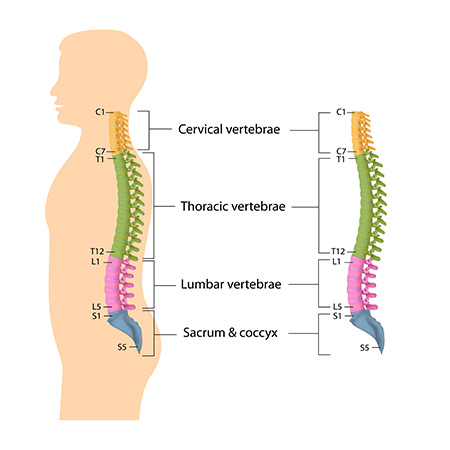
Cervical radiculopathy (or a pinched nerve) occurs when a nerve in the neck is compressed or irritated. When this happens, the condition may cause pain that radiates into the shoulder and/or arm and muscle weakness and numbness.
Anatomy of the Spine
Cervical radiculopathy occurs in the cervical spine–the seven small vertebrae that form the neck.
Causes of Cervical Radiculopathy
Cervical radiculopathy is most commonly caused by
- Cervical osteoarthritis
- Herniated Disc due to an injury or strenuous activity
- Degenerative Disc Disease
- Cervical Spinal Stenosis (narrowing of the canals in your spine through which the spinal cord travels)
- Cervical Foraminal Stenosis (narrowing of the canal in your spine through which the spinal nerves travel before exiting the spine)
- Trauma to the Neck (e.g., ruptured disc)
Other less common causes of cervical radiculopathy include
When to See A Doctor
If you have any of the following symptoms, call Dr. Ball for a consultation:
- Pain that spreads into the arm, neck, chest, or shoulder blade area
- Numbness or tingling in fingers or hands
- Muscle weakness in arms or hands
- Lack of coordination, problems with dropping objects from hands, deterioration in handwriting
- Loss of reflexes in your arms or legs
Diagnosing Cervical Radiculopathy
During your consultation, Dr. Ball will ask you to describe your symptoms, when they started, and what you have done so far to relieve pain and discomfort. He’ll also ask you questions about your medical history and any medications you may be taking, as well as any treatments such as physical therapy or pain injections/treatments.
As part of the physical exam, Dr. Ball will examine your neck, shoulders, arms, and hands for muscle weakness and problems with sensation or reflexes. He may have you move your arms or neck to see if certain movements cause or ease pain or other symptoms. Tests of coordination and gait may also be done.
Dr. Ball may also order imaging studies, including:
CT Scans. CT scans take detailed pictures of the bony anatomy of your cervical spine. These images help Dr. Ball determine whether you have developed bone spurs near the foramen in your cervical spine.
MRI. MRI studies check for damage to nerve roots, the spinal cord, or soft tissues. It will show Dr. Ball if your nerve compression is caused by damage to soft tissues such as a bulging or herniated disc.
Electromyography. This test, along with nerve conduction studies, will show how your muscles work when they are at rest and contracted and if a nerve is functioning normally. The test results will tell Dr. Ball if your symptoms are caused by pressure on spinal nerve roots and nerve damage or by another condition that causes damage to nerves (e.g., diabetes).
Treatment for Cervical Radiculopathy
There are both nonsurgical and surgical treatment options available for cervical radiculopathy.
Nonesurgical Treatment
Nonsurgical treatments for cervical radiculopathy may include physical therapy and medications:
Physical Therapy. Your physical therapist may include gentle cervical traction and mobilization exercises or other treatment modalities designed to reduce pain, strengthen neck muscles, and improve range of motion.
Medications. Dr. Ball may prescribe strong anti-inflammatory drugs (corticosteroids) or non-steroidal pain medication like ibuprofen or naproxen to manage your pain and decrease swelling. Other medications directed to address nerve pain, such as gabapentin, may be used. Alternatively, Dr. Ball may prescribe oral steroids or a steroid injection. The injection is placed in the space surrounding the dura, which is the membrane that surrounds the spinal cord.
Surgical Treatment
If patients don’t respond to conservative treatment and significant compression on the nerve exists to the extent that motor weakness results, surgery may be necessary to relieve the pressure.
There are several surgical procedures to treat cervical radiculopathy. During your consultation, Dr. Ball will determine the best procedure for you based on the symptoms you are experiencing and the location of the involved nerve root. Treatments include posterior minimally invasive foraminotomy, total (artificial) disc replacement, and cervical fusion.
Cervical Radiculopathy Treatment in San Ramon, CA and Fremont, CA
Dr. Hieu Ball has 20 years of experience specializing in the treatment of spinal disorders of adult and pediatric patients. If you would like to schedule a consultation with Dr. Ball for a cervical radiculopathy evaluation, please call our office at (925) 667-3745. You may also request an appointment online.




